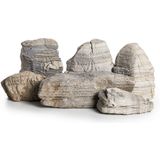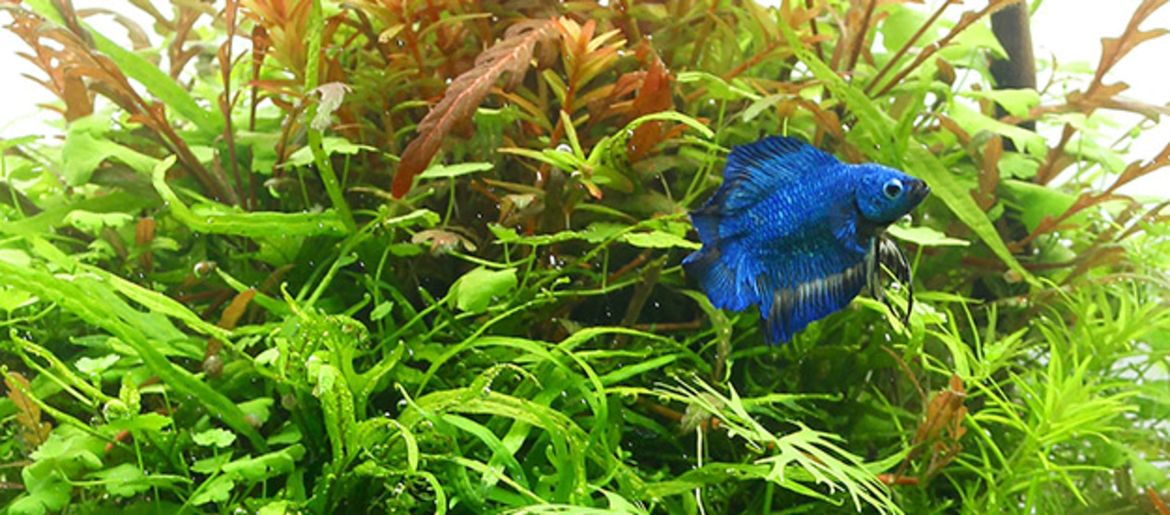Water Treatment
Water treatment for ornamental fish
Tap water is not just tap water, and if it works well for one in the aquarium, it does not mean that it works just as well in another pool in another area.
What water values do my aquarium animals need?
You have to look closely - not every fish can tolerate every water - especially if you want to breed - and invertebrates such as shrimps quickly become critical when the water values in the aquarium are wrong. Not only water hardness is a factor, but also things like nitrate or phosphate, for example. In some areas, the maximum level of 50 mg / l nitrate is regularly reached, and this can lead to moulting problems and even death for sensitive shrimps. Sulawesi shrimp even need very special water, simply to survive. But aquarium fish like the discus also don't like hard water, and others like the colourful cichlids from the African lakes of the Tanganyika and Malawi ravines should not be kept in acidic soft water. Soft water is also absolutely necessary for breeding many tetras, even if it can be kept in harder water, as with red neon.
Adapt the water to the fish and not vice versa!
But even if the fish or shrimp just tolerate harder water, you should ask yourself whether you really have to force a soft water animal into hard water if there is another way. Of course, when choosing the aquarium animals, you can simply limit yourself to what is good with the water values specified in the tap water, but you can just as well adapt the water to the shrimp. This is very easy with osmosis water and a corresponding mineral salt.
Toxins in tap water!
Even if the water values that we can measure are ok in your tap water, there are still many other factors that can also be dangerous: For example, chlorine added to a bacterial load in tap water is absolutely deadly for our aquarium animals. Shrimps get there in seconds, and fish can be severely damaged and even die. Heavy metals such as copper are released from old water pipes, and they are also fatally toxic to shrimp. Has it worked well in tap water for years? Unfortunately, this is not a guarantee, but it can still happen at any time that the water is disinfected with chlorine or silver (often even without warning). Absolutely harmless for humans, absolutely deadly for shrimp. Sometimes the dreaded polyphosphates are added to the tap water, which can even stop reproduction in fish and spawning fungi in crabs. They can also trigger algae plagues. For this reason, many responsible aquarists opt for water treatment and the use of an osmosis system.
Water treatment - for which aquarium inhabitants makes sense?
Whether or not it makes sense to use treated osmosis water in the aquarium depends on a number of factors. In the end, every aquarist has to decide whether water has to be treated for less sensitive animals such as Neocaridina shrimp or more robust fish. To a certain extent, of course, this depends on the water quality. However, many aquarium owners have had the experience that their more robust aquarium animals in treated osmosis water suddenly felt much better, that they ate better, their colours became more beautiful, they reproduced better and looked healthier and happier overall.
How does osmosis work?
The osmosis system is equipped with a membrane that allows the tiny water molecules to pass through, but nothing else. Therefore, the water that is extracted here is very pure. The Dennerle Osmose Professional 190 has a maximum output of 190 l per day (at 25 ° and 4.1 bar pressure). The ratio of osmosis water to residual water is 1: 2.5 - 1: 4 (depending on the temperature and the water pressure). This system is equipped with a flushing valve, which ensures an increased lifespan of the membrane and high continuous output, with which you remove performance-reducing deposits on the membrane. If you need less osmosis water, maybe the Osmose Compact 130 with a maximum output of 130 l per day (at 25 ° and 4.1 bar pressure) is the right choice for you. Here, too, the ratio of osmosis water to residual water is 1: 2.5 - 1: 4 (depending on the temperature and the water pressure). A little tip: With the wastewater from the osmosis system, you can water the flowers, for example.
Can you just use osmosis water like that?
Osmosis water is highly pure water, which means that it no longer contains minerals and the conductance is close to zero. There is no buffer at all for the pH value here, which means that the pH value can rush to unimagined depths or rise sharply. Pure osmosis water is therefore not suitable for aquarium animals. However, there are products that can be used to produce the exact water values that animals need: mineral salts. The same applies of course to demineralised water and rainwater or very soft spring water.
Help, there are so many mineral salts - which one should I use?
If you care for tropical fish and plants in the aquarium, the osmosis ReMineral + by Dennerle is perfect for most species. It increases the total hardness and the carbonate hardness in a good ratio and stabilises the pH. A full measuring spoon increases the total hardness by 2 degrees and the carbonate hardness by 1.3 degrees. This corresponds to a conductance of 140 µS / cm. Here you simply add as much salt as your fish need. If you want to take care of shrimp, you should first look at the types you want. Neocaridina have a hard time in very soft water, they need harder water with some carbonate hardness. You can do this with the ShrimpKing Shrimp Salt GH + / KH +. Here you get a pH value of approx. 7 to 7.5. A measuring spoon hardens 40 litres of water to a GH of 6-8 and a KH of about 3-4 - ideal for shrimps that prefer harder water with a little carbonate hardness. Bee shrimps and other shrimps from soft water such as Taiwan shrimps or bumblebee shrimps, which are kept on an active soil, do not like carbonate hardness at all, and the active soil would also be quickly saturated by an existing KH. That's why Dennerle has the ShrimpKing Bee Salt, which brings the pH to 6 to 6.5. A level measuring spoon gives a total hardness of 5-6 degrees, while the carbonate hardness is not raised at all. Then the conductivity is around 250 to 280 microsiemens.
For the specialists among the shrimps, the great red Sulawesi prawns Caridina dennerli, you cannot use normal tap water. They are used to very special water from their home. With the ShrimpKing Sulawesi Salt you bring osmosis water to a pH of 7.8 to 8.5 and increase the total hardness as well as the carbonate hardness. Here the natural growth is encouraged - a must for the small Sulawesi shrimps, who do nothing but feed them all day long. A level measuring spoon per 20 litres of water increases the total hardness to 6 to 7 degrees and the conductivity to 270 to 380 microsiemens. If you only have to raise the carbonate hardness in the water because the total hardness actually fits as far as possible and you only want to stabilise your pH value, you can use the liquid KH + elixir from Dennerle. 20 ml per 100 l of aquarium water loosen the KH by 0.6 degrees and the conductivity by 20 microsiemens / cm.
Important tips for dealing with mineral salts!
Please only add the salt to the freshwater and do not add it directly to the aquarium to avoid strong fluctuations in the water values. This is extremely important, especially with sensitive shrimps! If, contrary to expectations, all of the salt in the water does not dissolve, add the components that have not dissolved to the aquarium. They then dissolve a little later in the filter, so that's not a problem. You close the tin with the mineral salt for the aquarium immediately after use, because the salt draws water from the air and can then clump up badly. Then you couldn't use it anymore.
More water additives!
With the Humin Elixir you add humic substances to your aquarium water that practically all freshwater fish know and like from their biotopes. There is practically no body of water in which there are no humic substances. They arise when organic material is broken down. In the past it was assumed that humic substances had no effect, today we know that they can improve the health of fish and invertebrate aquatic animals decisively, that they strengthen the mucous membranes and can help shrimp to shed. With the Dennerle Humin Elixir you give your aquarium inhabitants an extra push in the right direction and supports them in staying healthy. Fish from waters with black water in particular benefit enormously from this water purifier! Discus, angelfish, neons in particular, but also many dwarf cichlids from South America and catfish are very grateful for adding humic substances - dwarf shrimps too by the way. The Dennerle Humin Elixir does not give the water an annoying colour, but can also be processed without a brown tinge. With the Vital Elixir by Dennerle you create a healthy environment for your aquarium fish. It contains aloe vera, which cares for the mucous membrane, and you add important minerals to the aquarium water that are quickly used up. In this way, you can avoid diseases in your fish that are caused by a lack of trace elements.
For this purpose, shrimp and crayfish have the Nano Crusta Mineral , which contains valuable montmorillonite and natural, bioactive calcium and magnesium. This not only binds pollutants in the aquarium water but also provides your crawlers in the aquarium with important minerals for building tanks.
We hope you enjoy your aquarium!
Chris Luckhaup
Latest reviews
-
 5.0 (2)
5.0 (2)Olibetta Frodo Rocks - 20 kg, 20 kg
-5%- Optimal and safe for use in freshwater aquariums & terrariums
- Ideal for planting thanks to the irregular surface
- Natural stones with a great texture
£55.98 £59.00 (£2.80 / kg)Delivery by April 29
Magazine Articles:
-
Great Britain: Free standard delivery from £59.90
-
Free
returns -
We operate in a
climate-conscious manner. Secure payments
with SSL encryption technology
